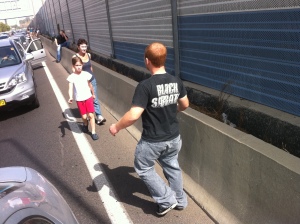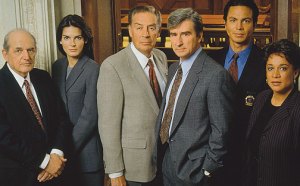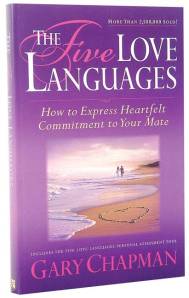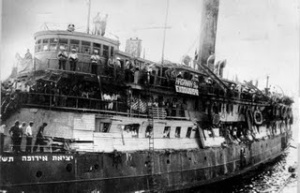Ron Cantor’s Testimony
That was the thought going through my mind one dark evening in the middle of North Carolina on a cool October night in 1983. Death was always a concern with me. I loved life and didn’t want to die—not now, not ever. However as the small yellow car swerved from side and to side and then began to spin around, that was the thought racing through my mind, “Is this it? Am I going to die?”
The car finally flipped over once or twice, I can’t remember. What I do remember was the first thought that came to my mind as we sat in the car in shock in the middle of nowhere: Jesus is not real. If Jesus were real this would not have happened.
That was a strange first thought for a Jewish young man who was raised with the belief that Jesus was not the Messiah. Why would such a thought even be a concern? Especially when my main concern should have been getting out of the car and getting help.
To explain that I have to take you back about eight months.
First, a little about my background. I am Jewish. I was circumcised on the eighth day, went to Hebrew school (this was a three-times-a-week Jewish Life and Culture school, that most North American Jews go to in addition to their formal education) and became Bar Mitzvah when I was thirteen.
I was not religious, but neither was I an atheist. I did not see any clear evidence for God or really care that much, as my main purpose in life was to have fun.
When I was seventeen years old I began to notice a change in the way my best friend Brian was acting. After quizzing him, it became clear that he had a deep religious experience with Jesus. I was not happy for him as I always looked at religious people as boring or weird. Why would anyone want to be religious, I thought. Nevertheless, it didn’t have anything to do with me because I am Jewish, and while I was not on the path to become the next Maimonides (Jewish sage), I did know at least one thing about being Jewish—and it wasn’t what we believed, but rather what we didn’t believe. We don’t believe in Jesus.
Nevertheless, Brian’s new found faith did awaken an awareness in me that I had no idea where I was going after I died. So many of us spend our whole life preparing for a thing called retirement, a period of time that some people never even reach and others only spend a short season there before they die. So much emphasis on this season and yet we never take the time to think of our eternal retirement and what we must do on earth to secure it.
Despite my passion for fun, I realized that if I died and spent eternity in hell, it would not be worth it. I had to find out the truth. Who is God and how do I serve him. This realization came to me about month after Brian’s experience.
On one occasion we were together and Brian had been using a certain phrase to describe his new state of being: Born again. “Brian, there is nothing in the New Testament about being born again!” I blurted out. This was funny because I had never read the Old Testament, much less the New Testament, but somehow I knew there was nothing in it about being born again. That is, until Brian opened his New Testament to John 3:3. In this passage Yeshua is talking to a Jewish rabbi named Nicodemus. Nicodemus believed that Yeshua had been sent by God because of the miracles He had been performing and wanted to ask him some questions. Brian read to me these words:
Except a man be born again he can not see the kingdom of God. (John 3:3)
When Brian read those words to me it was as if swords came flying out of heaven. I knew it was true. It was as if something had been blinding me and suddenly I could see. But I wasn’t too crazy about what I saw! I screamed inwardly, “No, this can’t be true. I am Jewish and we don’t believe in Jesus!”
Over the next few months I continued to wonder if this Yeshua could actually be the Messiah of the Jewish people, the way to eternal life. On Yom Kippur 1983 I decided that I would do something radical—I would fast! Like I said, I did not grow up religious and while I always went to temple to pray on Yom Kippur, it had never entered my mind to actually not eat for 24 hours. However, I wanted to find God—to find truth, and as a Jew this seemed like the most logical place to begin my search.
That evening I saw a young lady in whom I had been interested. She literary threw herself at me. (This never had happened to me before!) Her intentions were clear. However, contrary to everything inside of me as a young man, I pushed her away and told her that I could not. I was intent on finding God and I knew that breaking one of the ten commandants by taking advantage of a drunk young lady at the beginning of my fast was not the best start.
After 24 hours of not eating I did not feel any closer to God. I was hungry though! Discouraged, I headed off to college in North Carolina. I had hoped to find God and I didn’t feel any closer than when I started.
About a month later I was home during a five-day break from school, when I ran into Brian. The conversation quickly turned to Yeshua. Truthfully, I only had one question for him. My Jewish heritage was important, but I was willing to suffer criticism and even persecution from my own people if in indeed it turned out that Yeshua was the Messiah. However, as an 18-year-old who loved to have fun, I had to ask Brian this one thing: “Is you life better now than it was before.”
You see, I loved my life. Sometimes that meant doing things I knew were wrong. But I didn’t want to trade my fun life for a boring, religious life. Like I said before, other than Brian, everyone I knew who was religious seemed depressed and miserable—completely uninteresting. And if that was what Brian was offering, I wasn’t interested.
It seemed to me that the deal was that you live a boring life for God and your reward is eternal life. Of course, seventy or eighties years of boredom in exchange for eternal life is still a pretty good deal, but I was about to find out that that wasn’t God’s plan.
When Brian answered me his face lit up with joy. “I know God,” he confidently exclaimed and I could see he was telling the truth. “Ron, there is no comparison to the old life.” That was enough for me. I told Brian to call me up that weekend to go to his congregation. I wanted to check this out. However when the ringing phone woke me up after a night of drinking and partying, I told Brian I would come some other time.
Not long after that, I returned to Richmond again; this time to buy supplies. I was in the pharmaceutical business at that time in my life. What I mean is I would buy caffeine pills and sell them to friends at school, telling them it was speed. They didn’t know the difference, it was legal and I had some spending money. On the way back the young man who drove me, Dean and I began to talk about religion. I told him that my friend had been “born again” and had been talking to me about Yeshua. He told that he also had been a believer.
What he meant was that in high school he had given his life to Yeshua, but then later on, because of pressure from his friends, he left his faith. I asked him, “What was your life like when you were serving Yeshua?” This was still my main question.
Suddenly, just like Brian, his face lit up as began talk about Yeshua. “I had purpose. I woke up every day high on God.” As he went on to share about how wonderful it was to live for Yeshua, I couldn’t help but wonder why he would give it all up. “In the end I cared more about what my friends thought,” was his answer as his face when from light to darkness.
We continued to talk for the next two hours about Yeshua and as we were talking a presence came into the car. I had never felt such peace before in my life. What was this?
Dean told me that on Thursday he was going to take me to a movie about Yeshua in his hometown of Durham. I consented to go and at the end of the movie we were both in tears. It was a powerful movie but I was smart enough to know that movies can sway your emotions in many directions. I wasn’t going to start believing in Jesus because of a movie.
However on the way home I did something very unusual—something I can’t remember ever doing before—I prayed. “God, I believe You are real. A year ago I wasn’t sure, but now I am. I need to know how to serve You. Do I become a religious Jew? Lubavitch? Or is Yeshua the Messiah? If You show me, I will serve You.”
As I was praying silently, Dean suddenly lost control of the car as we went around a curve. The car began to swerve from side to side and then began to spin out of control. That was when I wondered, “Is this it. Am I going to die?”
Upside down, Dean and I made our way out of the car and walked to the road. Many people wrongly assume at this point that surviving the car accident is what caused me to embrace Yeshua. On the contrary, my first thoughts after realizing I was alive were, “Yeshua can’t be real. This would not have happened if Yeshua were real.” My goodness, my first prayer and I nearly get killed!
The story doesn’t end there. There was only one house near us, as we were in the middle of farm country. We walked up to the house and knocked on the door. Dean was in shock as he had not only totaled his car, but also almost killed us. I was still thinking about God.
A married couple opened the door. They were very helpful and the husband took Dean to use the phone. Meanwhile I noticed a bible and a magazine, in which the cover story was about a man named Keith Green, also a Jewish believer in Yeshua, who had died a year earlier in a plane crash.
I asked the wife if they were believers and she said yes. I asked her, “If Yeshua was the Son of God, the Messiah, how could they kill him? Why didn’t He get off the cross to prove it?” I didn’t know that that was exactly what those who witnessed His crucifixion said:
“He saved others,” they said, “but he can’t save himself! He’s the King of Israel! Let him come down now from the cross, and we will believe in him. He trusts in God. Let God rescue him now if he wants him, for he said, ‘I am the Son of God.’” (Matt. 27:42-43)
She explained to me that during His lifetime He did many miracles including healing those with terminal sicknesses like leprosy, causing the lame to walk, and even raising the dead. However, His mission was to die on the cross, not come down from the cross. He came to Israel for this purpose. According to Isaiah the Jewish prophet, the Messiah would come to Israel, be rejected by the Jewish people and ultimately give His life as a sacrifice for their sins:
He was despised and rejected by men, a man of sorrows, and familiar with suffering. Like one from whom men hide their faces he was despised, and we esteemed him not. Surely he took up our infirmities and carried our sorrows, yet we considered him stricken by God, smitten by him, and afflicted. But he was pierced for our transgressions, he was crushed for our iniquities; the punishment that brought us peace was upon him, and by his wounds we are healed. For he was cut off from the land of the living; for the transgression of my people he was stricken. He was assigned a grave with the wicked, his life a guilt offering, he will see his offspring and prolong his days, and the will of the LORD will prosper in his hand. After the suffering of his soul, he will see the light of life and be satisfied; by his knowledge my righteous servant will justify many, and he will bear their iniquities. (Isaiah 53:3-5, 8-11)
These words were written 700 years before Yeshua came. On more than one occasion they tried to kill him but could not, however when the time came for Him to “give his life as a ransom” (Matt. 20:28) He was willing. She explained to me that He gave His life and took my sins, so I would not have to suffer for my sins.
As a Jew, I always thought that was why we fasted on Yom Kippur—to be forgiven. However, when I went back and read the passages about Yom Kippur I discovered that fasting was merely the position of humility in which we approached God. Like if you were invited to a presidential dinner, you wouldn’t wear jeans and a t-shirt. Fasting had no power to remove sin. It was the sacrifice on Yom Kippur that dealt with sin—not fasting. It is not called Yom Tsom (Fasting), but your Yom Kippur (Atonement). It is no wonder I felt no closer to God when I had fasted the previous Yom Kippur. Without a sacrifice, there is no forgiveness.
Since the destruction of the Holy Temple in 70 CE there have not been any sacrifices. Even the Talmud says that from 30 CE (when Yeshua was crucified) until 70 CE (The Temple’s demise) God rejected the Yom Kippur sacrifices every year. The reason for this is simple. Yeshua died in 30 CE and there was no longer a need for a sacrifice as He was the once for all time and all sin sacrifice.
But now he has appeared once for all at the end of the ages to do away with sin by the sacrifice of himself. Just as man is destined to die once, and after that to face judgment, so Messiah was sacrificed once to take away the sins of many people; and he will appear a second time, not to bear sin, but to bring salvation to those who are waiting for him. (Hebrews 9:26-28)
As she was explaining this to me, I began to feel a presence. Not like the peace I had felt the other day with Dean, but this was pure power—like electricity all over my body. I could not fight it. It was the most amazing experience of my life. And suddenly it all made sense—I realized what was happening. Just a few minutes before I had told God, the Creator of the heavens and the earth, that I was willing to serve Him if He would simply show me the truth.
In less than a half hour from that prayer I was in a violent car accident that left us unharmed. As we approached the one house in the area, we found inside two real believers in Yeshua, and now I was sitting in their living room as she was explaining to me the very thing that I had asked God for just a few minutes earlier. To top it all off I was being filled with the presence and power of God!
That night I believed. I left that house a new man. My sins were forgiven. My name was written in heaven. I was enjoying the presence of God. Suddenly I could relate to the words of Nehemiah who said, “The joy of the Lord is my strength.” (Neh. 8:10) I was experiencing what I would later read in the writings of the Rav Shaul, one of the first Messianic Jews, who said that when we receive Yeshua we become new creations spiritually.
Therefore, if anyone is in Messiah, he is a new creation; the old has gone, the new has come! (1 Corinthians 5:17)
When you are born from above the Spirit of God comes inside of you and cleanses you from all the garbage of this world.
___________________________________________________
Maybe you are still struggling with the fact that you are Jewish and you were taught that Yeshua is not the Messiah. Consider these facts:
1. Yeshua is the name His parents gave Him. Not Yeshu. Yeshu is an acronym that rabbis used to refer to Yeshua, that stands for: May his name and memory be blotted out forever. Yeshua, on the other hand, comes from the word yeshu’a which means salvation. When the angel of the Lord appeared to His father, Joseph he said “you must name Him Yeshua, because we will save (from yeshu’a) his people from their sin.”
2. Maria was not the name of Yeshua’s mother, nor was she a little Catholic girl, but rather a young “sabarit” (Israeli) named Miriam, the same name as the sister of Moses.
3. The big controversy in the New Covenant was whether or not Gentiles had to become Jewish in order to believe in Yeshua! (See Acts 15.) All the original followers of Yeshua were Jewish and it never entered their minds that there were anything else.
4. Shaul, the writer of half the New Covenant, was a Jewish Rabbi who studied under Gamaliel, grandson of Hillel. He was a Pharisee and supervised stonings and imprisonments of Messianic Jews before he became a believer in Yeshua.
5. All the writers of the New Covenant, save one, were Jewish.
6. Tens of thousands of Jews in Jerusalem believed He was the Messiah.
“You see, brother, how many tens of thousands of believers there are among the Judeans, and they are all zealots for the Torah.” (Acts 20:21, CJB)
His Jewish devotees ranged from rabbis to peasants and everything in between. “And the word of God spread, and the number of disciples multiplied greatly in Jerusalem, and a great many [Jewish] priests became obedient to the faith” (Acts 6:7 NIV).
7. Yeshua fulfilled over sixty Old Testament prophecies. According to Mathematician Peter Stoner, the probability of Yeshua fulfilling just eight messianic prophecies is 1 in 100,000,000,000,000,000! That would be like covering Israel 22 meters deep in silver dollars, marking one of them, and then randomly picking it up! Let me write it again in case it didn’t sink in: That is the probability of someone just fulfilling eight of the prophecies about Messiah, and Yeshua fulfilled more than sixty!
WHAT NOW?
Maybe you are like me. You love life. God is an afterthought. If only things could stay the way they are. But the truth is they won’t. Not to be morbid, but you will get older and eventually you will die. No one has beaten it yet. And if the scripture from the book of Hebrews is correct, after death comes judgment.
The truth is that I was not afraid of judgment because I never consider myself a sinner. After all, I had never killed anyone, right? How sad is that? My definition of not being a lawbreaker is simply to have never killed anyone.
Here is the question you must ask yourself. Have I broken God’s law? You see when I finally measured my life against the Ten Commandments I realized that I was guilty. Just take a look:
I. Do not have any other gods before me.
II. You shall not make for yourself an idol.
III. You shall not make wrongful use of the name of the Lord your God.
IV. Remember the Sabbath day and keep it holy.
V. Honor your father and your mother.
VI. You shall not murder.
VII. You shall not commit adultery.
VIII. You shall not steal.
IX. You shall not lie.
X. You shall not desire things that don’t belong to you (like your neighbors wife!)
How many of those have you kept? Most people jump to number six, saying they have not committed murder, but Yeshua said that if you simply hate someone you are guilty of murder. He said the same thing about adultery, if you desire it in your heart, it is as if you have done it!
You see when you are judged by the Holy One it won’t be based on your actions alone, but your thoughts as well. God’s word is sharper than a two edged sword, meaning that it cuts deeper than flesh and goes all the way to the soul, “judging the thoughts and intents of the heart.” (Hebrews 4:12-13)
At this point you may be realizing that we are all guilty. Even if you hired the best lawyer to convince God that you keep two or three of the commandments, you would still be guilty of breaking seven or eight. What judge would let a lawbreaker go free?
GOOD NEWS
Once you realize this fact—that you are guilty before a Holy God—you can receive the best news of all. Just this week a young American girl who has been imprisoned in Iran for over a year was told that if she paid $500,000 she could go free. She didn’t have the money, but the US government paid the priced and she was released.
Yeshua paid the price for you to be free and live a new life. When He died, He died for you. When you admit that you are sinner and need his forgiveness and repent of your sin, you will be forgiven. Forgiveness cannot be obtained any other way. He was sent to Israel and we rejected him, but He is the salvation of the Jewish people. This is what He said to His Jewish followers:
Jesus answered, “I am the way and the truth and the life. No one comes to the Father except through me.” (John 14:6)
“I tell you the truth, whoever hears my word and believes him who sent me has eternal life and will not be condemned; he has crossed over from death to life.” (John 5:24)
“The thief comes only to steal and kill and destroy; I have come that they may have life, and have it to the full.” (John 10:10)
The only question is do you want life? Eternal life? It is free is you will turn to Yeshua now. Pray this prayer:
Yeshua, I turn to You for salvation and forgiveness. I believe that You are the Messiah, the Son of God and that You die for me and rose from the dead. Forgive me and set me free from sin. Break the power of Satan from me completely as I give my life to You fully. Even as You have forgiven me all of my sin, I forgive those who have sinned against me. Let Your Spirit fill me now and let me experience eternal life.
















